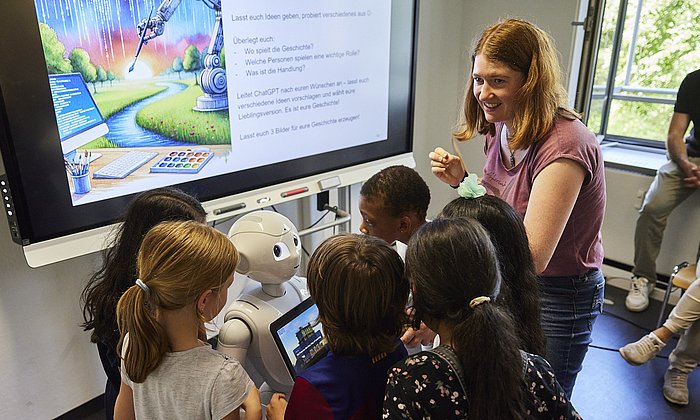Artificial intelligence in university development
TUM issues a comprehensive AI strategy

Significant advances in artificial intelligence (AI) and natural language processing have reached society. AI's scope, scale, and impact are estimated to be more profound than any other technology in history.
President Prof. Thomas F. Hofmann emphasizes: "With this first TUM AI Strategy, we are providing a valuable framework for the use of AI technologies. We want to encourage members of our university community to use AI tools responsibly in order to fulfill our specific institutional requirements more effectively and efficiently in all areas of TUM and to promote innovation in higher education. At the same time, we are making great efforts to ensure ethical standards, transparency, fairness, and data protection and to minimize potential risks."
The AI strategy was formulated with the intensive involvement of the TUM community. Dr. Alexander Braun, Senior Vice President of Digitalization and IT Systems (CIO), explains: "AI has the potential to revolutionize education and research. Our goal is to offer our community a safe and productive environment. A particular focus is on training and educating our students, researchers, and employees in the use of this new technology."
Strategic priorities until 2030
The TUM AI strategy outlines the plans for implementing AI technologies in five key fields of action:
- Integration into the curriculum: AI will be successively integrated into academic programs and extracurricular offerings. Students will acquire essential skills in areas such as data analysis, machine learning, and algorithm development. Additional offerings will be created for lecturers and staff.
- AI-supported learning environments: TUM is developing intelligent assistance systems and AI-based learning and examination environments to promote personalized learning and adaptive learning environments.
- Research and development: AI will be indispensable in numerous disciplines to overcome complex challenges and gain new scientific insights. The necessary research infrastructure is, therefore, being continuously expanded.
- Operations and administration: AI-supported tools should make documentation, support, and general processes more efficient and effective and speed up day-to-day tasks.
- Ethics and transparency: Addressing ethical issues such as bias in AI algorithms, data protection, and the impact of AI on work processes plays a central role. The aim is to strengthen trust in AI systems and ensure transparency.
The complete TUM AI strategy is available to all interested parties for download and use:
The use is licensed under CC BY-NC-SA 4.0.
AI tools already available
Various AI tools are already freely available to all members of TUM: The university has acquired licenses for Microsoft Copilot and Grammarly. In teaching, there are already several initiatives for AI-supported teaching, such as Artemis and tumtutor. Extensive resources are available for research and teaching via the Leibniz Supercomputing Center. Further specialized AI software will be added as required and in accordance with the guidelines.
Technical University of Munich
Corporate Communications Center
- Ulrich Meyer
- presse@tum.de
- Teamwebsite
Contacts to this article:
Dr.-Ing. Alexander Braun
Senior Vice President Digitalization and IT Systems (CIO)
Technical University of Munich
cio@tum.de
www.cms.ed.tum.de


